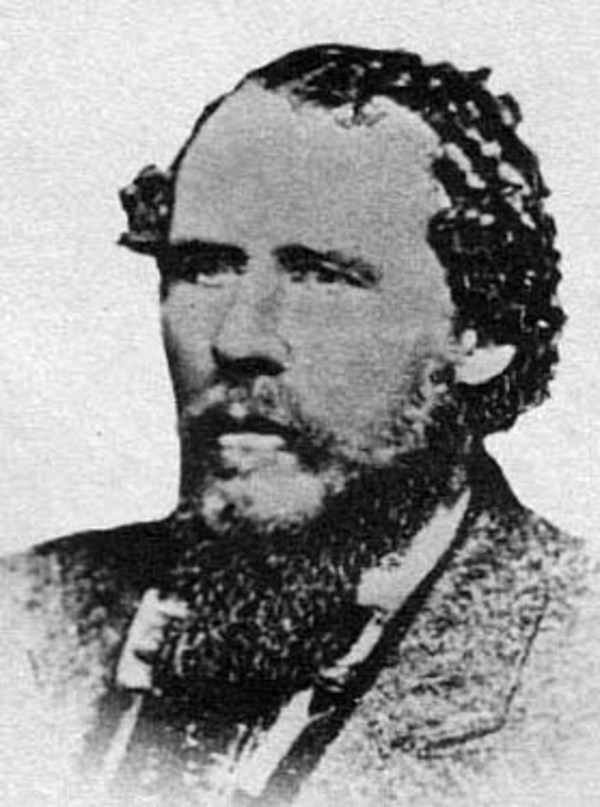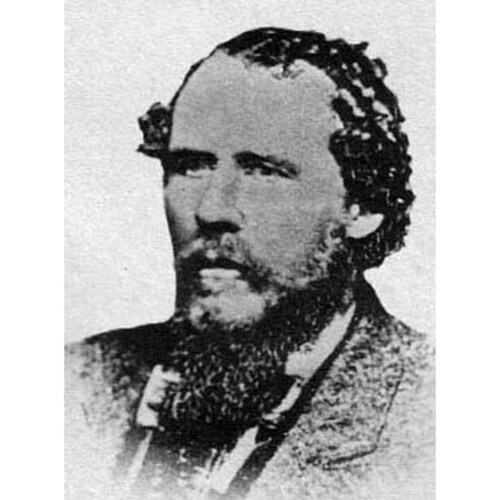
Source: Courtesy of Wikimedia Commons
CORNISH, FRANCIS EVANS, lawyer, legislator, civic official; b. 1 Feb. 1831 in London, U.C., son of William King Cornish; d. 28 Nov. 1878 in Winnipeg, Man.
The family of Francis Evans Cornish had settled in the London District of Upper Canada in 1819; he was educated at the London grammar school and called to the bar of Upper Canada in 1855. A conservative and a member of the Orange order, Francis Cornish was an alderman in London from 1858 to 1861, and was elected mayor of the city in 1861. Cornish had a popular following but gained a reputation as the “rowdy” mayor, being charged by opponents with bigamy, assault, drunkenness, and boisterous public disputes. He was defeated in 1864, it is said, when members of the city council called out the militia to ensure an honest election. In 1860 he had sought unsuccessfully a seat in the Legislative Assembly of Canada for the constituency of East Middlesex. He failed also in 1871 to win the city of London constituency in the Legislative Assembly of Ontario.
In 1872 Cornish moved to Winnipeg, where he set up a law practice and became active in civic and provincial politics. One of the leaders in the movement for the incorporation of the city of Winnipeg, he was elected its first mayor in 1874 and served for one year. The most important result of his administration was the enactment of a by-law providing for the beginning of municipal services. The same year he became a member of the provincial legislature for the constituency of Poplar Point, which he represented until his death.
Cornish was a genial and colourful figure, whose name both in London and in Winnipeg is associated with a series of flamboyant political antics. His success in mayoralty campaigns in London is attributed to smooth organization of the voters. He had even arranged, it is said, for British soldiers quartered in the area to take up residence for 24 hours at election time and vote for him. In Winnipeg in 1876 he was arrested and fined for stealing a poll-book on election day. On another occasion, the story goes, he kidnapped his opponent on the eve of an election, brought charges of corruption against him, and then stated that the failure of his opponent to come forward to answer the charges was tantamount to a confession of guilt.
In Winnipeg, Cornish was associated with the group opposed to the policy of reconciliation among the divisive forces engendered during the Red River disturbances of 1869–70. He assisted individuals seeking the arrest of Louis Riel*. He was partially instrumental in arranging for the arrest of Riel’s adjutant-general, Ambroise-Dydime Lépine*, in 1873; the following year he assisted Stuart Macdonald, prosecutor, in the trial of Lépine. The judgement in this case allotted the reward offered by Ontario for the arrest of those responsible for the death of Thomas Scott*, and Cornish received $400 of it.
Cornish died at the age of 47 of cancer of the stomach. In the last year of his life he re-entered civic politics as an alderman in Winnipeg. On 31 Oct. 1853 he had married, in London, Victorine Clench, who survived him.
Begg and Nursey, Ten years in Winnipeg. Manitoba Free Press (Winnipeg), 29 Nov. 1878. Dom. ann. reg., 1878. Orlo Miller, A century of western Ontario; the story of London, “The Free Press”, and western Ontario, 1849–1949 (Toronto, [1949]). Stanley, Louis Riel, 187, 191, 193, 210–11.
Cite This Article
Hartwell Bowsfield, “CORNISH, FRANCIS EVANS,” in Dictionary of Canadian Biography, vol. 10, University of Toronto/Université Laval, 2003–, accessed January 23, 2025, https://www.biographi.ca/en/bio/cornish_francis_evans_10E.html.
The citation above shows the format for footnotes and endnotes according to the Chicago manual of style (16th edition). Information to be used in other citation formats:
| Permalink: | https://www.biographi.ca/en/bio/cornish_francis_evans_10E.html |
| Author of Article: | Hartwell Bowsfield |
| Title of Article: | CORNISH, FRANCIS EVANS |
| Publication Name: | Dictionary of Canadian Biography, vol. 10 |
| Publisher: | University of Toronto/Université Laval |
| Year of revision: | 1972 |
| Access Date: | January 23, 2025 |



